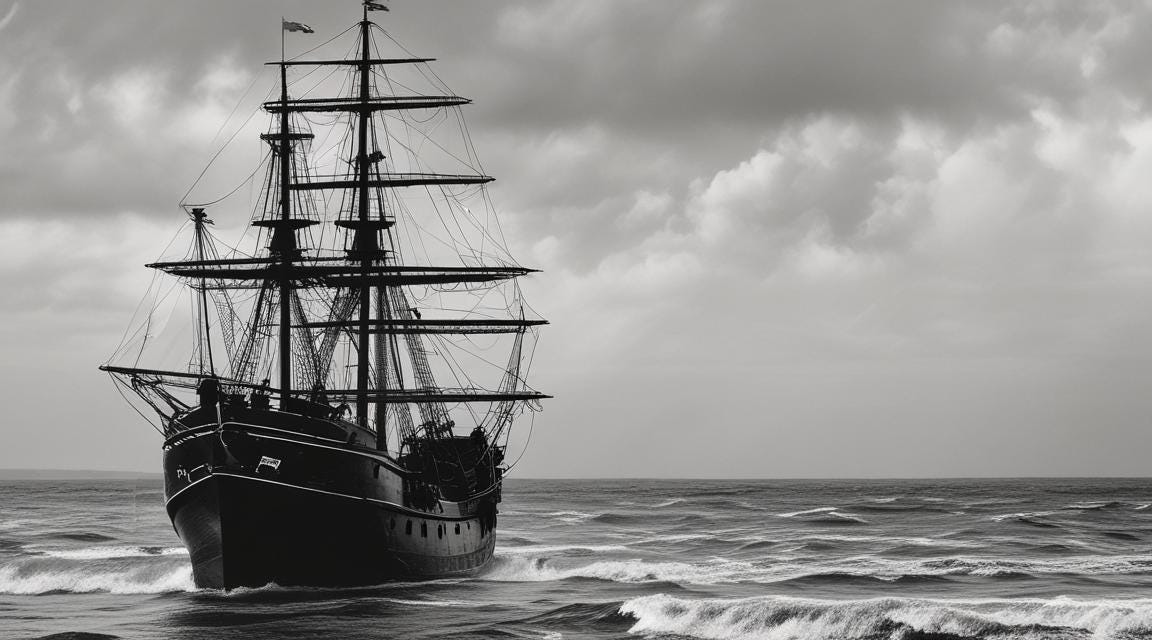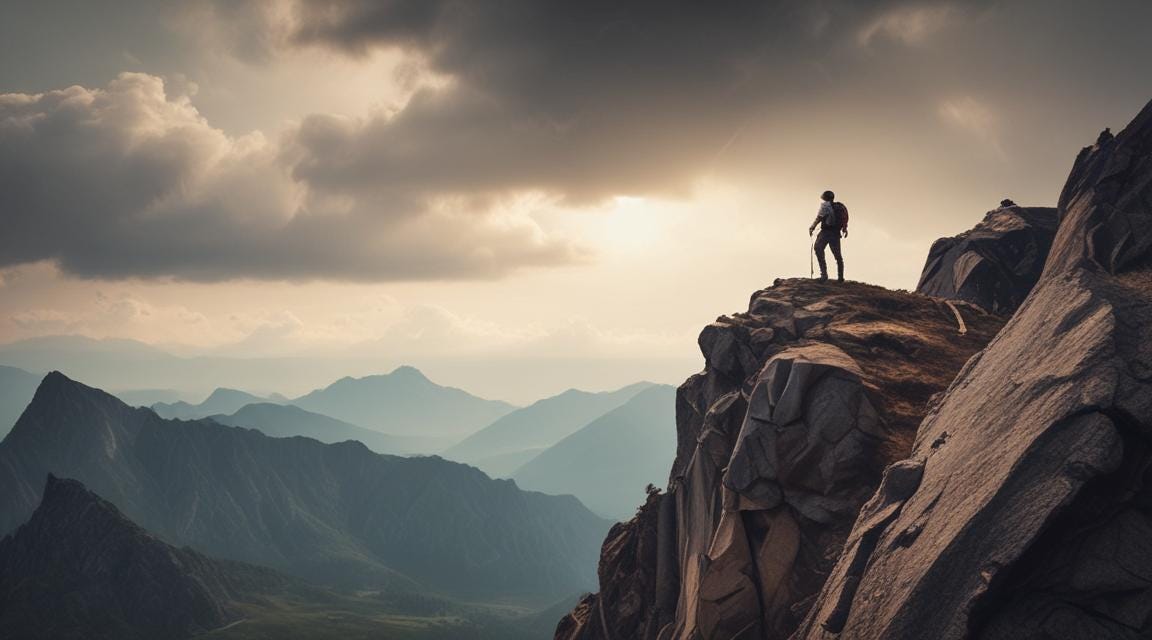What are you afraid of?
Fear Frontiers
Yes, I have fear within myself, but I also have non-fear within myself.
Zen Master Thich Nhat Hanh
When researching Hudson’s Bay Company (as I’ve talked a little about in a previous newsletter), I dwell on the fear explorers and trappers must have felt. A new world with new people; it’s the equivalent of traveling to an undiscovered planet by today’s standards.
Their fear didn’t stop them, but it may have guided other behaviors that didn’t end well, such as the subjugation of indigenous people. Fear may have also motivated them. Were they running away from something in the Old World?
My most exciting and compelling writing originates from memorable feelings that I reflect on. Fear is a captivating emotion. It drives us, shapes us, pulls us in. Sometimes fear becomes the primary emotion that guides our actions. I’ve always been resistant to that. Constant “what if” thinking can be paralyzing. What if the plane crashes? What if I get rejected? What if I fail?
On the other hand, the absence of fear is just as bad; it is insanity.
Writing what you’re afraid to write is a heady exercise. Does that mean I reveal my deepest thoughts, publish them, and hope for the best? Fear (masquerading as logic) always creeps in. Proofreading is certainly necessary, but does the work become too sanitized? But what will people think? If they’ve subscribed to this newsletter and received something a little different, will they unsubscribe? Think I’ve gone off the deep end?
The Next Adventure newsletter is about going to, exploring, and learning about new places and ideas. Waiting around the corner in our minds, there are limitless places to go.
New Information + Experience = Knowledge & Growth
Emotional connections made in our minds create a sense of adventure. Fear is often a big part of that experience. Controlled fear can be fun (e.g., skydiving, rollercoaster, skiing). Fear guides, inspires, and limits us in both thought and action. When does fear become mentally or physically limiting? Can we harness our fear, repurpose it, and manipulate it for our own benefit?
This edition of the Next Adventure newsletter explores some of these fear frontiers I experience as a writer.
After all, writing means exploring and finding meaning beyond mere descriptions.
Physical Fear
The most scared I’ve ever been was traveling in Bihar, India, in 2003. Snoozing in the sleeper car on an overnight train, the car was overwhelmed at 2 AM by hundreds of young men looking to share the already crowded space. It was chaos: aisles and bunks full of passengers. My mind filled with thoughts of revolt, riot, and political unrest. The US was invading Iraq. 9/11 wasn’t that long ago. Bihar had an unfavorable reputation in the guidebooks for high crime. Over the course of 10 minutes, I woke from a deep sleep, was confused, thought for certain I was about to die, panicked, closed my eyes and breathed, then accepted my death. A local traveling companion informed me that there was a standardized test for a government job at a nearby administrative building, and everyone wanted to take the test as part of the application process. The crowded train was harmless. “I guess I won’t be dying tonight,” I thought.
On another occasion, I was traversing the summit of a mountain in the Northeast following a friend. Stepping down an un-skiable icy rock ledge in ski boots, barely hanging on, it was too late to go back uphill. But it was petrifying to continue down: I had no choice but to proceed. Quickly, I took three deep breaths and accepted my fate: I may be dead momentarily, and that was the way. I accepted this fear and let it pass through me, then did my best to stay alive by calmly focusing on the task ahead.
Mental Fear
It seems remarkable that I can experience a similar fear as in that train car or mountain top while typing here in my office. The thought of writing about something revealing, taboo, unusual, or something that makes me feel vulnerable is equally terrifying.
What I realize is that the reaction I had to those fear-of-death examples comes from my formal instruction in meditation in India and France. My practice yielded my current coping mechanisms for physical fear of death in the form of mindful breathing and acceptance. But I have yet to apply this practice to my writing.
What am I afraid to write about and why?
For example, during a brainstorming/drafting session based on the question above, I wrote down a bunch of items I’m afraid to write about, including the following:
“The most productive writing I do is when I’ve downed 16 ounces of coffee and 5 mg of Adderall.”
Why am I afraid to write that? It's not about a fear of dying, but two other types of fear I learned about from the teachings of Thich Nhat Hanh.
Fear of Rejection
“Wow, he takes Adderall to get his work done?! What a loser.”
“Suck it up and get it done. Just drink more coffee.”
Fear of Not Being Understood
“Does he have ADHD? Doesn’t everyone pretty much have ADHD?”
“Why is he taking Adderall? Is he getting it illegally?”
“Is he promoting Adderall? Drug use?”
In this case, working through the fear means thinking about it and accepting it but also counteracting it with compassion. If someone responds negatively to my statement or my writing about this issue, then I accept that, nothing more.
Curiosity plays a role in recognizing opportunities to dig deeper and ask questions. In this specific case, why is neurodivergence, such as ADHD, still stigmatized? Downplayed? Why should people be punished for exploring mental health?
Using the example above, the opportunity is to grow. Grow by sharing something personal about myself that I typically am private about. Grow by showing compassion for those who may not understand, judge me, or be upset by this statement.
Why am I private about it? Fear. And in this case, fear loses. To what? Non-fear (I said this would get heady).
Why bother facing these fears as a writer (or anyone)? Because they lead us on new adventures.







Jesse, great post, and I especially appreciate how you compare or perhaps juxtapose actual fear of death during your adventures with the psychological or emotional fear you feel when writing and being vulnerable. Isn’t it amazing how this can happen? You’d think after what you’ve experienced out in the world that writing couldn’t possibly make you feel fear, yet there is something so terrifying about sharing our inner world with strangers. I guess what it comes back to—and what is most compelling, to me anyway—is why? What do we stand to gain from this vulnerability? Why bother when it’s so easy to not write? To your point, perhaps it has something to do with growth and the adventures we can create through our work. Good stuff friend. Thanks for the read!
I friggin' love this. More about fear please.